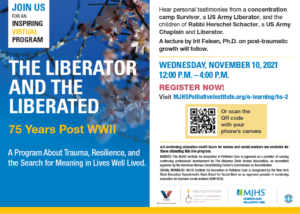On Wednesday November 10, I will present a lecture at the annual MJHS Conference, the topic of which this year is “The Liberator and the Liberated: 75 Years Post WW II”. This year, we will have the special privilege of listening to the experiences of a survivor who was liberated from a concentration camp, a liberator who was among the US Army forces that liberated a concentration camp, and the children of Rabbi Herschel Schacter, US Army Chaplain who was also among the liberators of a concentration camp. We will hear how these remarkable people describe their lived experience of the impact of such trauma, and how it influenced their lives, their view of the world, and their priorities in the aftermath of such extreme experiences.
The survivors who experienced the atrocities of the Holocaust, and the liberators who experienced the horrors of WWII and saw the concentration camps with their own eyes, are passing away. This will be a unique opportunity to still hear the voices of the witnesses to one of the most horrific watershed events of the 20th century, and to learn from these speakers what they would like us, healthcare providers, to be able to understand and be sensitive to when we assist them at the very end of life. The lessons we might learn from elderly survivors of the Holocaust are also important for the care of other aging survivors of traumatic events. My lecture will help professionals who work with Holocaust survivors, veterans, and other trauma survivors, recognize signs of past trauma and its manifestations in the present. One of the important aspects that will be elaborated is the inherent risk for distancing and potential loss of empathy for trauma survivors, even in well-intentioned healthcare providers. I will offer practical solutions to self-monitor and improve delivery of person-centered, trauma-informed care. In addition, the presentation will also highlight resilience, hope and meaning, as manifestations of “post-traumatic growth” , so professionals can respect and enhance these strengths in patients as they accompany them during the end-of-life experience.
More information about the conference, including registration instructions, is available by clicking on the image below. Even you can’t attend but are interested, you should register because the event will be recorded. Once the recording is ready, all people who registered will receive an email and will be able to access the recording and view the recording.
Irit Felsen


Please let us know when you are expecting to speak. Thanks.
Sorry, the day was very busy and I did not see your question in time. The meeting today was recorded, and I will announce on my blog when the recording is available. So, if you missed the meeting live you will still be able to access the recording.
Irit
Thanks so much.